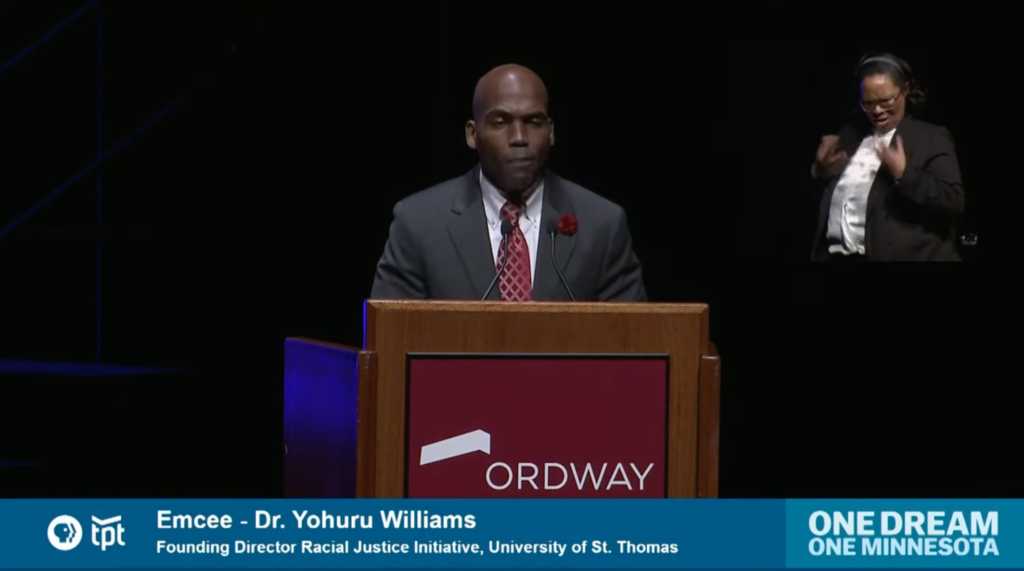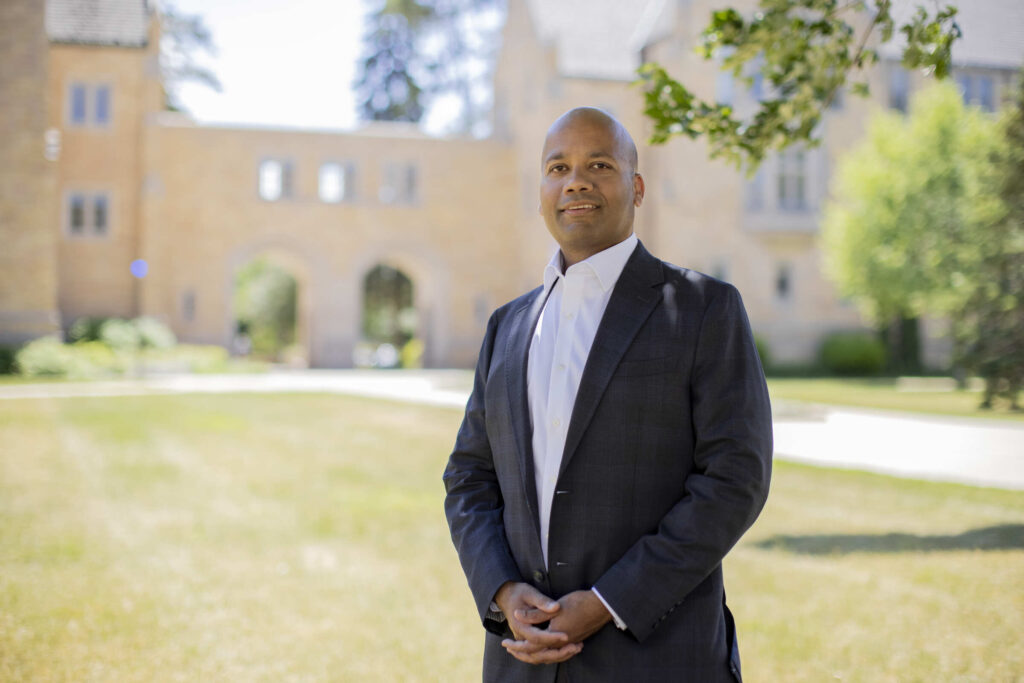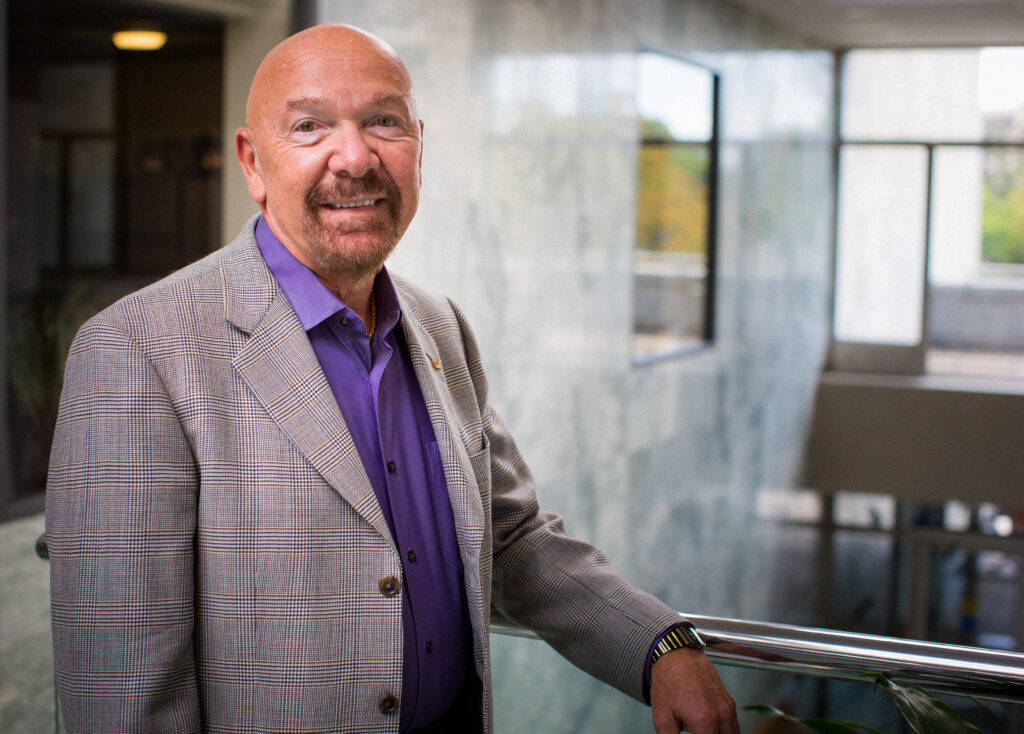Emotional intelligence (EQ) is an essential attribute of effective leaders. Leaders with high EQ stand out from their peers and can successfully navigate diverse, fast-paced environments. When you face a new challenge, step into a new role, or transition to a new company, applying your EQ is as important as applying your business acumen. In this series of articles on EQ, Opus College of Business adjunct faculty member Jill Hauwiller will highlight key components that – with reflection and intentional practice – will become strategic tools for achieving the goals you set for yourself and your business group this year.
Better relationships. Deeper trust. Greater clarity of purpose and goals. Self-awareness is more than just a personal trait – it’s a strategic tool for professional success.
Imagine you’re in a meeting where tensions are high, deadlines are looming, and decisions need to be made quickly. How do you respond? Your ability to recognize and manage your own emotions in these moments can have a profound impact on your team and the outcome of the project. This is the power of self-awareness.
- Jill Hauwiller... One of the most powerful competencies that separates good leaders from great ones is emotional intelligence (EQ).”
As you’ve advanced in your career, you’ve likely become comfortable and familiar with many of the technical aspects of leadership, but one of the most powerful competencies that separates good leaders from great ones is emotional intelligence (EQ). At the heart of EQ is self-awareness. It’s the skill that allows successful leaders to understand themselves deeply, leading to sound decisions, more confidence, and greater professional growth.
One of my executive clients was highly valued in his organization for his technical expertise. However, people were hesitant to seek him out for advice because he could be dismissive or critical. As we worked together, his self-awareness grew, and he recognized how his behavior limited his impact. While a personality overhaul isn’t the goal of coaching, his increased self-awareness helped him adjust certain behaviors, leading to greater involvement in projects and stronger, more trusting relationships with his peers and team.
Why self-awareness is key for high performance
Self-awareness is like having a superpower that fuels every other leadership skill. When you understand your own emotions, strengths, and areas for growth, you gain the ability to navigate workplace challenges more effectively. Research also shows that leaders who are self-aware are more able to take in feedback and align their impact and intent, in part, because they understand how they are perceived.
Leaders who are in tune with their emotions recognize when stress is starting to build, allowing them to manage it before it becomes overwhelming or impacts performance. Understanding one’s emotional triggers is also a key aspect of self-awareness. By identifying the physical manifestations of stress – whether it’s shallower or more rapid breathing, a headache, or fatigue – you can better anticipate and manage your reactions. Leaders with high self-awareness are more likely to understand how stress affects them both mentally and physically.
Self-awareness even extends to understanding one’s energy levels throughout the day. Leaders who are in tune with their natural ebbs and flows of energy throughout the day can plan their work schedule to maximize productivity. For example, you might tackle complex tasks in the morning when your mind is sharp and reserve routine work for the post-lunch energy slump. This kind of self-knowledge not only boosts productivity but also reduces burnout.
Deepening self-awareness: techniques to get started
Self-awareness is an ongoing process that requires intentional practice. Here are some actionable strategies to try today to help strengthen this foundational skill:
- Mindfulness. Practices like meditation, breathing exercises, or simply taking a moment to check in with your emotions throughout the day can help increase your awareness of how you’re feeling in real time. One way to develop self-awareness is through reflection, such as journaling. Try micro-journaling – take just a couple of minutes each day to jot down how you’re feeling and what’s on your mind. Whether it’s at the beginning or end of the day, this habit creates space to reflect on what’s working well and where you can improve. You can even pair it with something you already do every day, like making notes while your coffee or tea is brewing each morning.
- Reflection. A critical aspect of self-awareness is recognizing your emotional triggers and sources of energy. Ask yourself: What situations cause stress or frustration? When do you feel most energized or depleted? By reflecting regularly on these questions, you can start to anticipate challenges before they arise and manage them more effectively.
- Feedback. Seeking and receiving feedback from others is essential to building self-awareness. Take time to reflect on what types of feedback resonate with you and how you typically respond. Share your preferences with those colleagues and encourage them to provide holistic feedback, including EQ indicators like how your communications come across. These insights can help reveal “blind spots,” aspects of ourselves that we may not be aware of, deepening your self-awareness over time.
The impact of self-awareness on leadership success
Self-awareness is not just about personal growth – it drives tangible results in leadership. By knowing yourself well, you’ll be better equipped to lead others. This is the first and most important step toward becoming the kind of leader who inspires and influences not only through knowledge and expertise but through EQ and authenticity.
Self-awareness is a lifelong journey. As you move through different phases of your career, your understanding of yourself will continue to evolve. Stay curious about your own emotions, reactions and behaviors. With consistent practice, self-awareness will become the foundation of your EQ and, ultimately, your leadership success.

Bio:
Jill Hauwiller is adjunct management faculty and a leadership consultant at the University of St. Thomas – Opus College of Business. She is an experienced coach and expert in organizational design and development whose career has included in-house roles in large global organizations and consulting experience with Fortune 50 to family-owned businesses. From med tech to manufacturing to higher education to professional services, Hauwiller works across industries to support executive and high potential leaders. She is also a founding partner of coaching firm, Antheo.







